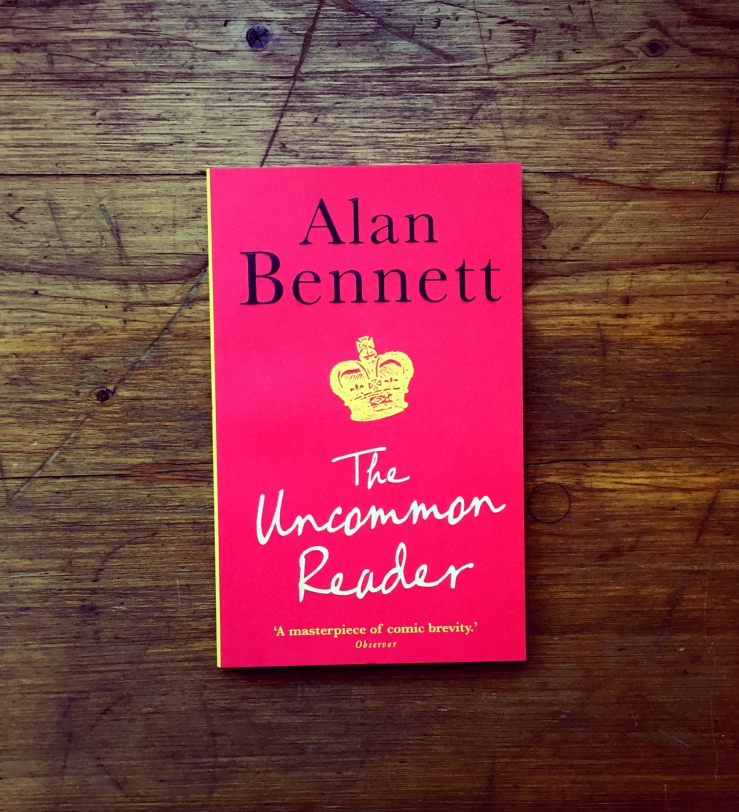Blinding light peeked through my window pane, a half-open book covered my face as I laid on my bed with my eyes closed trying to shut out the day. There I was on a Sunday afternoon, drowsy, not wanting to face the day because my heart was not on its place. It had gone missing like losing a cellphone in a drunken taxi ride – you know it’s with someone else and you miss most what you take for granted. It’s gone though and to get it back, you have to turn elsewhere.
I opened my eyes and lifted the book from my face to find a new heart in the pile of well-arranged words, shielding myself from the morning sun. Locked myself into this fictional book about a person — a Queen, to be precise, who discovered a love you can’t lose – a love for literature and becomes the Uncommon Reader.

What if Queen Elizabeth at the age of 70-something were suddenly to become a voracious reader? What would happen? This quirky and odd premise is what Allan Bennet lays as the foundation for the book “The Uncommon Reader”. This intriguing idea creates a fantastic and royal love letter, not just to the Queen’s journey of exploring the beauty of literature, but also reading and books. The novella is not only lovely, but filled with indulgent wits about people and the practice of habitual reading.
“The appeal of reading, she thought, lay in its indifference: there was something undeferring about literature. Books did not care who was reading them or whether one read them or not. All readers were equal, herself included.”
Books reveal their deepest secrets to you – all you have to do spend time with them. This type of understanding of reading is one of the reasons I found this book to resonate with my own love for literature in the early phases of my life. My mom, also an avid reader, not only taught me how to read — she created a game for me challenging me to read what’s written on the billboards whenever we passed the highway. This grew into a habit and perhaps now a compulsion for reading. Interestingly enough in the novel, this is not the way the Queen begins to read, rather she starts late; She even does it out of duty, feeling obliged to borrow a book from a mobile library parked near the palace.
Though we — me and the fictional Queen — had a different start, I could see myself and other reader’s journey’s in the raging passion for reading that grows through its pages. She voraciously moves from one book to another, she finds pleasure in finding an author like discovering a favorite new song from a new band with only a few hundred views on youtube. Then she begins to enjoy reading so much one book isn’t enough and often she has two or three books she’s reading at the same time. The book shows through this monarch’s journey the argument that literature itself is the ultimate form of democracy, that no matter how uncommon we are as a reader, books treat all readers equally.
“Books are not about passing time. They’re about other lives. Other worlds. Far from wanting time to pass, one just wishes one had more of it.”
The Queen has a way of reading that makes it so inspiring. Though she read with trepidation at first, and discovered words and reading carefully – for she know she can’t do it simply for pleasure. She never treated books as a tool to pass the time, or looked down on literature frivolous. In the book, she saw reading as “a vast country to the far borders of which I was journeying but will never reach.” She found other lives, other worlds; She found lessons she had never been in a position to learn due to her social obligations and the politics of royalty. Books become in a sense an escape from her as a monarch a freedom to be with the citizens she serves.
The book made me wonder if Mr. Bennet portrayed his own literary sensibilities into the Queen – her character channeling his message to people. Maybe it was how he wanted to tell us that books, as devices to ignite the imagination, a way to new realities that welcome all people, Queens or commoners, and create a connection through a common experience of reading.
Reading these days increasingly seems trivial with digital magazines, handphones, and the ever greater expansion of digital content. Information has become so abundant and it has affected my reading. I read more than I ever did before, but much of that reading is superficial. A tweet here, a status update there, an Instagram photo with a comment over there. What I read does not necessarily become knowledge, freedom, or a new country to discover.
Nowadays, with society demanding children read by 4 years of age, we read because we have to and we will have to for our whole lifetime. Some children think of reading as a punishment. Some teenagers think of reading as exhausting. Some adults think of reading as a waste of time.
The Queen is a book and story that acts as a symbol of what reading can offer you beyond information. As the Queen discovers reading it reminds us that reading can be a way to spark imagination, find new worlds, heal wounds, and find your heart. She says:
“You don’t put your life into your books, you find it [life] there.”
Life is found in books – I found my heart again on Sunday hiding from the sun in The Uncommon Reader and I encourage you to do the same.
